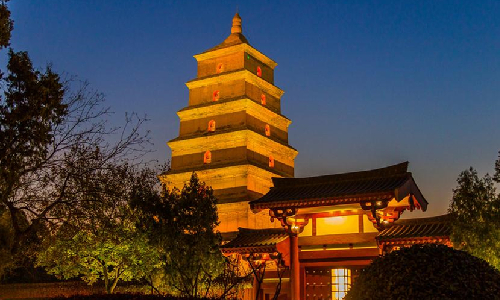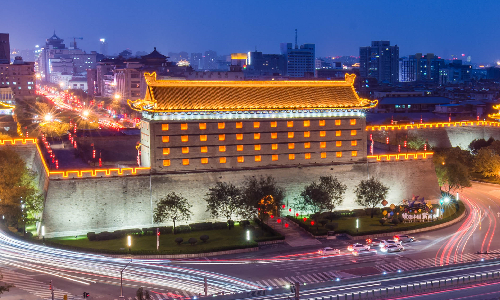Our visa free tour Xi’an devotes to providing the most convenient and comfortable tour for you. It can help you save the visa processing time and cost, and allow you to better and more freely arrange your tour time easily. Meanwhile, 72 hour visa free Xi’an policy will give you more time to enjoy the attractive scenery and delicious local food. In our visa free tour Xi’an, you will visit Terra Cotta Warriors and Horses Museum, Big Wild Goose Pagoda, Old City Wall, and other famous attractions. And our experienced guide will recommend you the most famous and delicious local food, such as Rougamo(Chinese hamburger), pita bread soaked in mutton or beef soup and Liangpi(springy noodles seasoned with a tangy, spicy, savoury sauce). If you are looking for the most convenient tour that can help you reduce the trouble of applying for a visa, just contact us to make a reservation and get ready for your Xi’an visa free tour.

Upon arrival, your experienced guide will pick you up at the airport and you will start your Xi’an visa free tour. First, you will be transferred to the Terra Cotta Warriors and Horses Museum, located to the east of the airport and nearly 60 kilometers away. It will take about 1 hour to get to the destination from the airport. This museum refers to the burial pits of the Mausoleum of the First Qin Emperor(259BC-210BC). There are tens of thousands of pottery figurines, pottery horses, and bronzes buried in the burial pits. These funeral objects are arranged neatly and similar in size to real objects. Pottery figurines can be divided into chariot warrior, cavalryman and infantry. You can find that these terracotta figures have different postures. Some gallop on horses; some draw bows to shoot arrows; and some kneel on the ground. The facial features of each pottery figurine are exquisite and different, making you feel they are alive.
Then we will drive southwest for nearly fifty minutes to Big Wild Goose Pagoda. Located in the Da Ci’en Temple, it was built under the auspices of Master Xuanzang of the Tang Dynasty (618-907) to preserve the scriptures and Buddhist statues brought back from India. There is a legend about the origin of the name of this pagoda. Long ago, monks in an Indian temple believed in Mahayana Buddhism and could eat meat. One day, when a flock of wild geese flew overhead, a monk said: “Now everyone has nothing to eat. Buddha should know we are hungry!” Hardly had his voice faded away, a goose fell and died in front of the monk. He was surprised and happy. He told all monks in the temple and they thought it was the enlightenment of Buddha. They did not eat the goose but buried it at the place where it fell, and later they built a pagoda named Wild Goose Pagoda here to commemorate this thing. Later, Master Xuanzang visited the pagoda while studying in India. After returning home, he built a pagoda modeled on the Indian Wild Goose Pagoda. And he named it Big Wild Goose Pagoda.
Great Mosque is located in the north of the Big Wild Goose Pagoda, about 8 kilometers away. The temple was first built in 742, and then underwent several repairs and renovations. It is one of the four oldest mosques in China. The temple is rectangular. When you enter the temple, you will see the well-preserved pavilions, corridors and halls. And there is a 9-meter-high wood-structure archway built in the early 17th century, with a glazed-tile roof, exquisite cornices and fine carvings. Wandering around these old buildings will take you back to one thousand years ago.
Muslim Quarter is a famous food street in Xi’an. There are many restaurants and different kinds of stalls standing on both sides of the street. You will see stalls selling mirror cake, dried fruit, candied fruit and other snacks. If you like, you can buy some. And then you can go to a restaurant to taste Rougamo(Chinese hamburger), pita bread soaked in mutton or beef soup, Liangpi(springy noodles seasoned with a tangy, spicy, savoury sauce) and other special dishes. Pita bread soaked in mutton or beef soup is especially worth tasting. You need to break the pita bread into small pieces by yourself. And the chef will help you put these pieces into specially made mutton or beef soup. Then you can enjoy it.

After breakfast, we will head to the Old City Wall. Xi’an Old City Wall is the largest and best-preserved ancient city wall in China. The existing city wall is built in 1370, with a total length of 13.7 kilometers. It is located in the central area of Xi’an. The wall is 12m high, 12-14m wide at the top and 15-18m wide at the bottom. The outline of the wall is rectangular, surrounded by a moat. And there are 18 city gates. Standing on the city wall, you can admire the beauty of this ancient city with a history of over 2,000 years.
Then we will drive to Hanyangling Museum. It was built depending on the Yangling Cemetery where the emperor and queen of the Western Han Dynasty (202 BC-8 AD) were buried. Covering an area of about 20 square kilometers, it is the largest museum in China. It is mainly composed of the emperor mausoleum, queen mausoleum, burial pits, mausoleum temple, etc. In burial pits, there are warrior figurines, warehouses, living utensils made of ceramic, iron and copper, and ceramic animals such as cattle, sheep, pigs, and chickens, showing the prosperous economy and material life in the Western Han Dynasty. After visiting, you will be transferred to the airport to take the flight back home.


Author:Xuelei Zhang
Proofreader: Yan Liu
| City | Five Star hotel list | Four Star hotel list |
|---|
 |
![]() About your child or infant, please contact us for a discounted price.
About your child or infant, please contact us for a discounted price.



We started with a few days in Beijing & ended in Shanghai, from where we visited the Forbidden City and Great Wall. In between we visited Terra Cotta Warriors Museum, Panda Base, Shanghai Disneyland.

We had a wonderful holiday in China which will remain long in the memory. China is a breathtakingly beautiful country full of splendid temples and palaces, mountains and rivers, peaceful rural scenes and bustling shopping streets.
 QUICK ENQUIRY
QUICK ENQUIRY